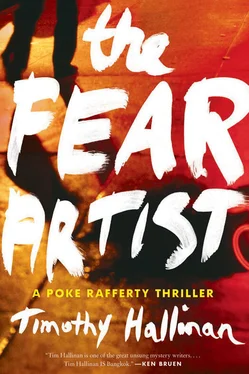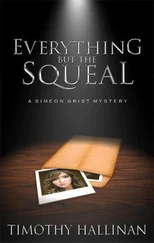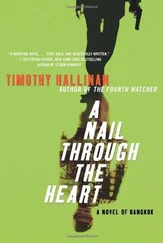Timothy Hallinan - The Fear Artist
Здесь есть возможность читать онлайн «Timothy Hallinan - The Fear Artist» весь текст электронной книги совершенно бесплатно (целиком полную версию без сокращений). В некоторых случаях можно слушать аудио, скачать через торрент в формате fb2 и присутствует краткое содержание. Жанр: Криминальный детектив, на английском языке. Описание произведения, (предисловие) а так же отзывы посетителей доступны на портале библиотеки ЛибКат.
- Название:The Fear Artist
- Автор:
- Жанр:
- Год:неизвестен
- ISBN:нет данных
- Рейтинг книги:4 / 5. Голосов: 1
-
Избранное:Добавить в избранное
- Отзывы:
-
Ваша оценка:
- 80
- 1
- 2
- 3
- 4
- 5
The Fear Artist: краткое содержание, описание и аннотация
Предлагаем к чтению аннотацию, описание, краткое содержание или предисловие (зависит от того, что написал сам автор книги «The Fear Artist»). Если вы не нашли необходимую информацию о книге — напишите в комментариях, мы постараемся отыскать её.
The Fear Artist — читать онлайн бесплатно полную книгу (весь текст) целиком
Ниже представлен текст книги, разбитый по страницам. Система сохранения места последней прочитанной страницы, позволяет с удобством читать онлайн бесплатно книгу «The Fear Artist», без необходимости каждый раз заново искать на чём Вы остановились. Поставьте закладку, и сможете в любой момент перейти на страницу, на которой закончили чтение.
Интервал:
Закладка:
Rafferty says, “What happens if we leave the door open?”
“Alarms. And alarms go off if I don’t key in the inside code, too, right about now.”
“Go to it.”
The maid punches up some numbers and then pushes a button with ALT under it and another above a tiny black telephone icon. She holds the telephone button down for a count of three and then steps back, hands folded in front of her.
“What’s that button?” Rafferty asks.
“If you don’t hold it down, the alarm will go off anyway. That way, even if someone has the combination, it probably won’t work.”
“What’s the code in here?” Rafferty asks.
“I’ll write it down for you.” She crosses the hall, opens the drawer in a marble-topped table, and pulls out a pen and pad. “For outside,” she says, writing 3616900 . “In here, this one.” She writes 43892 . “Then hold down the little phone button for a count of three.”
“And when I open it from inside?”
“No problem. You only need the code for closing it after it gets opened from out there.”
A telephone begins to ring, straight ahead in the dusk of the dining room. Then another, from somewhere to the left, and another. “Let it ring,” the maid says. “It’s for him, and no one who calls him will talk to anyone else. They won’t even leave a message. If there’s no answer here, they call his cell phone.”
It seems as though phones are ringing all over the house. Rafferty automatically counts the rings until, at six, they stop.
“Good,” he says. He swallows. The ringing telephones have made it real, somehow. Everything he wants in the world right now comes down to the next few minutes. “Now you go with Morticia here.”
“And if I don’t want to?”
“Then Morticia will shoot you,” Ming Li says. She pulls up her shirt to display the gun stuck into her pants.
“I’m not getting shot,” the maid says. “The car?”
“The car.”
Rafferty says, “Where’s Neeni?”
“Down the hall. Last room before it turns left.”
“Thanks. Go with Morticia.”
He watches them cross the porch and step down into the black water, now dappled with widening concentric circles as the rain gains strength. When Ming Li opens the door of the car and steps aside for the maid to climb in, he hears a metallic click behind him, and he whirls.
Nothing. No one is there. The heavy dining-room furniture stands there like massive, browsing herbivores. Nothing seems to have changed.
Turning back to close the front door, he replays what he saw and realizes what was different. Ignoring the urge to double-check, he very deliberately shuts the door and makes sure it’s engaged, all his attention trained on the open space at his back. Only when the door is secure does he turn, unhurriedly, to face the back of the house.
The double door at the rear of the dining room is open an inch or two. Not enough to admit a telltale draft, but not actually closed either. Closing it would probably have made the latch engage with another, louder click.
Rafferty says, “My, my.” His face is cool with perspiration. He touches the gun through his shirt, just making sure it he’ll get it on the first try, and moves down the hallway.
The living room is sunken two steps, carpeted in an oyster white with a random gray fleck, mercilessly overfurnished in gray leather and distressed, whitewashed wood. It is the work of a professional designer who thought the room was bigger. The room smells of damp, most likely water seepage from the storm. Bangkok’s emerging upper-middle class has created a boom market for new, semipalatial houses built of soda crackers and promises, and Rafferty is pleased to see that Murphy has bought one.
There’s nowhere for anyone to hide in the living room, so he puts it behind him and goes into the dining room, looking at everything except the open door. Twelve high-legged chairs surround the big table, and a mahogany sideboard towers almost to the ceiling on the left. Jammed into the corner is a card table, inlaid with stylized face cards of agate and jasper and other colored stones. Four cane-bottomed chairs lean against it, price tags still visible on the backs. Everything he can see looks like it arrived on the same truck. It’s a big room, but there’s barely space to move.
The phones begin to ring again: one in the room he’s in, one from behind him in the living room, and at least two others, one faint enough to be upstairs. The insistency of the noise increases his uneasiness. He counts six rings again, standing still, until they stop.
Ahead of him, through an eight-foot archway, is a blinding kitchen, all reddish saltillo tile, pale beige granite, and white appliances, as brilliantly lit as an operating room. He stands in the archway between the dining room and the kitchen, listening. Now that the phones have gone silent, he hears rain on the windows and the pat-pat-pat of a leak, water dripping onto fabric.
And then he smells something. It’s faint and sharp at the same time, like urine on a floor two or three rooms away, or the germy odor of dirty clothes that have been piled damp in a hamper for days. The door creaks behind him. He turns, but it’s swaying back and forth by itself, obeying the air currents that ghost through the room.
He leaves it ajar and goes back toward the entrance hall, thinking about calling Ming Li, but what’s he going to say? There’s a spook in here with me? He knows who it is, and he’s pretty sure he’s not afraid of her.
So he takes the stairs, two at a time, stands at the top for a moment, and decides to start with the most distant door and work his way back. The door at the end opens into what is clearly the master bedroom, the size of a small ballroom with a vaulted ceiling. It looks to him like it was decorated by the birds who drape Disney heroines in badly designed gowns: an acre of shell pink organdy hangs from a towering frame above the king-size bed, which is mounded with enormous pastel pillows, like big Valentine candies. The wall to the right is mirrored from floor to ceiling, reflecting an ambitious home gym: treadmill, rowing machine, and a couple of hinged and counterweighted contraptions whose function he can only guess at. An overstuffed couch and a table jostle each other under the front window. Money-quite a bit of it-has been misspent here.
The newer wife, he thinks.
He angles across the room, smelling sachet and face powder and the raw, jangly perfume of hair spray, into a bathroom so prettied up it seems like an architectural euphemism for the natural functions it was built to accommodate. A connecting door opens into a smaller room.
Clearly this is where Murphy recharges his prodigious, murderous energy. The carpet was either never laid or has been peeled back, baring a floor of gray, industrial cement. A narrow single bed has a paper-thin pillow and two rough blankets thrown over it. At the foot of the bed is an olive green, army-issue trunk, securely locked, and on the opposite wall is a rough, barely finished wooden dresser with white china knobs on the drawers. Above the dresser, set into the wall where a mirror might be, is a gun safe, which is locked as tightly as the chest. The furniture is dented and scratched, and as Rafferty looks around the room, he has the sense that this value-free assemblage of chipped, hard-surfaced junk has followed Murphy from place to place, while a succession of newly graduated village girls filled the other rooms of houses just like this one with the imitation lives they’d seen on television.
Being in Murphy’s room brings back the sense of pressurized fury he’d experienced when he saw the man face-to-face. He has an impulse to call Janos, but instead he looks at his watch-6:52. He’s been inside for only fourteen minutes. Murphy doesn’t expect him to show up at the shopping plaza until eight or eight-thirty. He’s got plenty of time.
Читать дальшеИнтервал:
Закладка:
Похожие книги на «The Fear Artist»
Представляем Вашему вниманию похожие книги на «The Fear Artist» списком для выбора. Мы отобрали схожую по названию и смыслу литературу в надежде предоставить читателям больше вариантов отыскать новые, интересные, ещё непрочитанные произведения.
Обсуждение, отзывы о книге «The Fear Artist» и просто собственные мнения читателей. Оставьте ваши комментарии, напишите, что Вы думаете о произведении, его смысле или главных героях. Укажите что конкретно понравилось, а что нет, и почему Вы так считаете.












